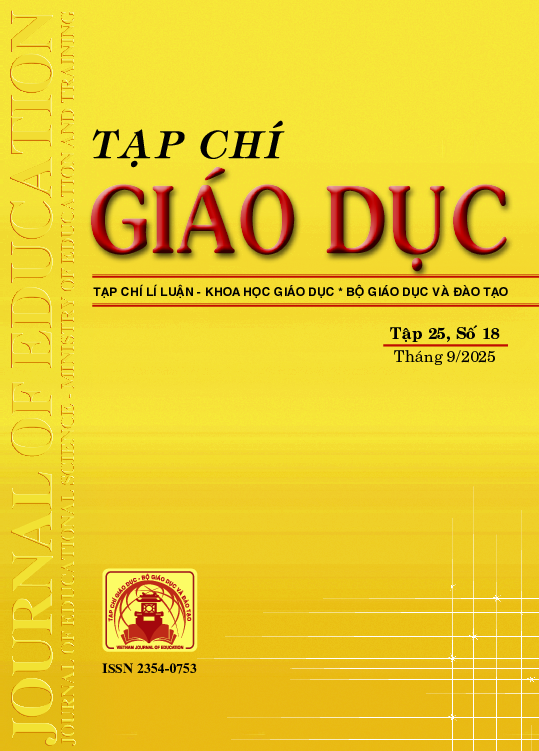Ứng dụng sơ đồ tư duy và trí tuệ nhân tạo trong việc nâng cao hiệu quả học từ vựng tiếng Pháp chuyên ngành Cảnh sát cho sinh viên Học viện Cảnh sát nhân dân
Tóm tắt
In the context of reforming English for special purposes education at police academies, the integration of technology and visualization methods into teaching has become an urgent requirement to enhance the effectiveness of vocabulary instruction and learning. This study aims to evaluate the effectiveness of a learning approach that combines mind mapping with artificial intelligence (AI) in supporting first-year students at the People's Police Academy in learning specialized French vocabulary. An action research was implemented with 80 students, divided into experimental and control groups. The results indicate that the experimental group achieved significantly higher learning outcomes and expressed positive feedback on the model. The model contributes to improving vocabulary retention, application, and fostering a positive learning attitude. The study recommends expanding the model to other language skills and investigating its long-term impact across more diverse learner groups.
Tài liệu tham khảo
Alharbi, K., & Khalil, L. (2023). Artificial intelligence (AI) in ESL vocabulary learning: An exploratory study on
students and teachers' perspectives. International Journal of Social Science and Education Research Studies,
(7), 1327-1335. https://www.researchgate.net/publication/380465714
Al-Jarf, R. (2009). Enhancing freshman students’ writing skills with a mind mapping software. Asian EFL Journal,
(2), 4-33.
Buzan, T. (2010). The mind map book: Unlock your creativity, boost your memory, change your life. BBC Active.
Chang, H. M., Liu, P. C., & Wang, C. L. (2025). Integrating artificial intelligence in police education: An analysis
of the top-down approach at Taiwan's Central Police University. Asian Journal of Education and Social Studies,
(1), 14-27. https://www.researchgate.net/publication/387698793
Chung, T. M., & Nation, I. S. P. (2003). Technical vocabulary in specialised texts. Reading in a Foreign Language,
(2), 103-116.
Gardner, H. (1983). Frames of mind: The theory of multiple intelligences. Basic Books.
Kemmis, S., & McTaggart, R. (2014). The action research planner: Doing critical participatory action research
(3rd ed.). Springer. https://doi.org/10.1007/978-981-4560-67-2
Luckin, R., Holmes, W., Griffiths, M., & Forcier, L. B. (2016). Intelligence unleashed: An argument for AI in
education. Pearson Education. https://www.pearson.com/uk/educators/schools/news/intelligence-unleashed.html
Nation, I. S. P. (2001). Learning vocabulary in another language. Cambridge University Press.
Nguyen, T. M. H. (2022). Using Quizlet in generating learners' autonomy in learning English vocabulary.
Proceedings of the 7th National Conference on Language Teaching and Learning, 45-53.
https://www.academia.edu/94770481
Ngo, T. H. T. (2022). The English-majored students' practices of mind maps in writing skills. International Journal
of TESOL & Education, 2(4), 170-183. https://i-jte.org/index.php/journal/article/view/121
Sweller, J. (1988). Cognitive load during problem solving: Effects on learning. Cognitive Science, 12(2), 257-285.
https://doi.org/10.1207/s15516709cog1202_4
Vygotsky, L. S. (1978). Mind in society: The development of higher psychological processes. Harvard University
Press.
Zhang, Y. (2023). Study on the application of mind mapping to English vocabulary teaching in senior high school.
Journal of Literature, Languages and Linguistics, 100, 1-6. https://www.davidpublisher.com/index.php/
Home/Article/index?id=52109.html
Tải xuống
Đã Xuất bản
Cách trích dẫn
Số
Chuyên mục
Giấy phép

Tác phẩm này được cấp phép theo Ghi nhận tác giả của Creative Commons Giấy phép quốc tế 4.0 .












